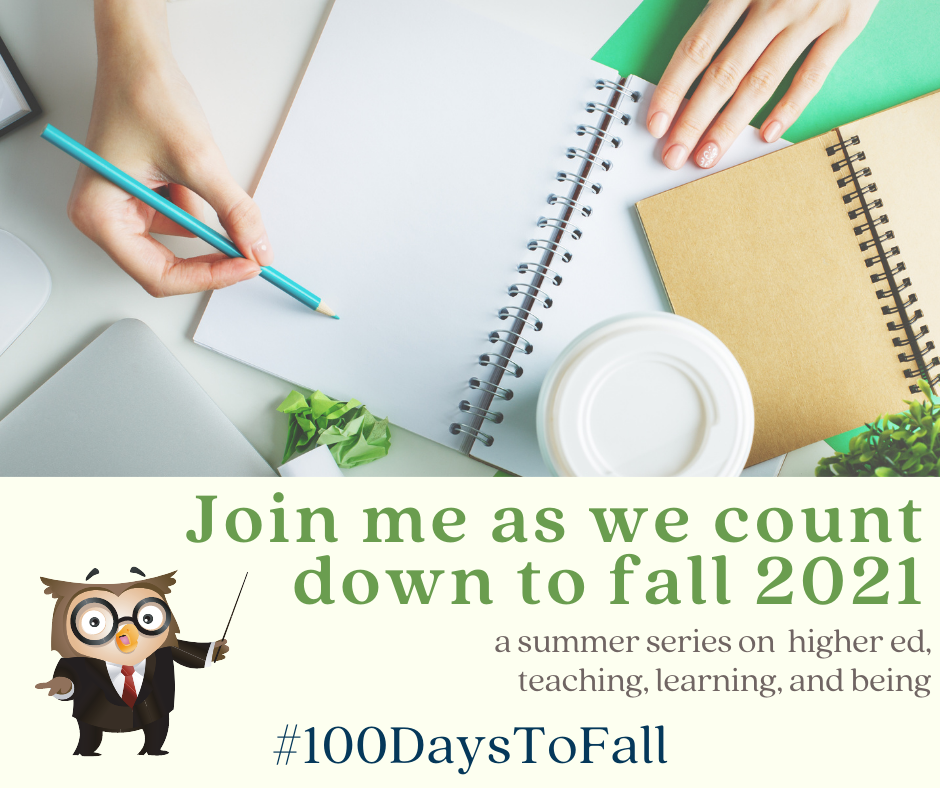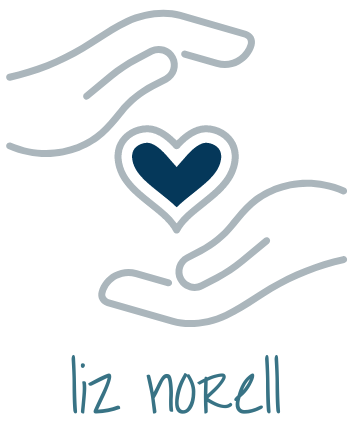On May 7, my college hosted a 100 Day Countdown kickoff event — it was (basically) 100 days before the fall semester begins. I was honored to be invited to share a few faculty thoughts on our college’s move to (mostly) 7-week classes in the fall semester, and the whole thing was captured on a live YouTube stream.
But afterwards, as I reflected on the few minutes we took to anticipate the arrival of what we desperately hope will be a return to semi-normal life, I realized that this is an opportune moment for me to spend those 100 days doing more than just occupying a space of reactivity and anticipation. It is, in fact, a terrific invitation to invest time this summer thinking about the next phase of my higher ed career, my teaching and learning, and my general sense of being in this very bizarre time.
When COVID hit in March 2020, I wasn’t in the right frame of mind to tackle a writing project of this sort. For starters, none of us could have known it would last more than a year … although, if we had allowed ourselves to engage in some critical thinking, we actually probably could have. I remember thinking in April 2020, “If we’re not back in the classroom in August, I don’t know what I will do.” I felt despair to my core. But I didn’t need to; the answer was always clear: I would do the best I could. As you do.
Now, though, with, like, 15 months of COVID times behind me, I’m in a much better headspace and heartspace to engage in this sort of reflection. And so, this post officially kicks of my #100daystofall series.
Over the last week or two, I’ve been reading Parker Palmer‘s inspiring 1997 book, The Courage to Teach. I’m certain I first heard of this book while reading someone else’s teaching book, but it had been languishing on my books-about-teaching bookshelf for months. Something inside me knew this was the right time to read it. Boy, was I right.
Palmer’s thesis is hauntingly similar to the core argument of my own work-in-progress teaching book, namely: Teachers who are in touch with their own rich inner life, and who make efforts to align their teaching self with their authentic self, will ultimately have a greater impact on their students, their own lives, and the world.
In other words: Authentic presence in our work matters way more than we are typically told or taught.
In his final chapter, Palmer talks about social movements and their power to allow us to live undivided lives. I’m reminded of a since-passed friend TJ, who used to say to me at least once per conversation, “SOCIAL MOVEMENTS ARE EVERYTHING, LIZ!” TJ would have appreciated Parker Palmer’s work. Bringing our inner values and authentic selves into alignment with our institutional and academic selves can be a radical action. To do so in the context of a movement, Palmer insists, requires a willingness to go public.
Palmer writes:
“As we find our place in the movement, we will discover that there is no essential conflict between loving to teach and working to reform education. An authentic movement is not a play for power — it is teaching and learning writ large. Now the world becomes our classroom, and the potential to teach and learn is found everywhere. We need only be in the world as our true selves, with open hearts and minds.” (p. 190, emphasis added)
These words, particularly those I’ve marked in bold, were so resonant for me. For years, I’ve tried to assuage the potential misperception of my work as being that of an enterprising woman bent on rising up the leadership ladder. To be honest, I am rather fond of my 9-month contract and comparatively heavy teaching load. Any career shift away from this rather satisfying life and into a more administrative role would have to have some pretty serious potential to make a bigger impact in the world than I am already able to make.
But Palmer offers an important reframing of the un-ignorable impulses of my heart. I’m not aspiring for promotion or power; I’m instead seeing the world as my classroom, and to live authentically in my vocation requires infusing all I do with the values I hold dearest. Just as Paul Watzlawick says that we cannot not communicate, I’ve come to believe that a teacher cannot not teach.
I hope you’ll come back for future installments of the #100DaysToFall series! I’m eager to see where this takes me.








